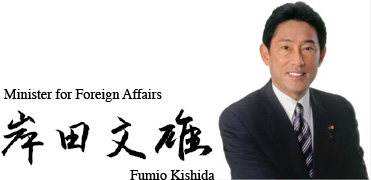Japan's Official Development Assistance White Paper 2013
Foreword
This year marks the 60th anniversary of Japan's Official Development Assistance (ODA) which was initiated after joining the Colombo Plan. Our ODA programs have contributed to Japan earning considerable trust of the world. On the other hand, the international environment surrounding ODA is dramatically changing, bringing with it changes in the roles demanded of ODA.
The first of these changes in the international environment is changes in the political and security environment. In order to realize a peaceful and prosperous international community, Japan must implement ODA more strategically and support countries that share universal values such as freedom, democracy, human rights and the rule of law as well as our strategic interests.
As globalization proceeds on the economic front, many developing countries have been eyed as new destinations of investment and new markets, leading to inflows of private finance that exceed ODA. Against this background, ODA's role as a catalyst for attracting private finance has become even more important for the sustainable development of developing countries. ODA creates a virtuous cycle in which supports for infrastructure development and development of business-savvy human capacities lead to the sustainable growth of developing countries, and this in turn has positive effects on the world economy.
Nevertheless, all around the world there still remain many countries where development has confronted setbacks due to a host of reasons including conflict and civil war, and many people who cannot enjoy the benefits of development in the face of severe disparities. Delivery of basic health and medical services to all people, along with efforts to realize a society in which women shine, will contribute to improving the lives of each and every person and creating a more prosperous world. Such supports precisely give shape to the principle of "human security" to which Japan attaches importance.
Defining development cooperation for developing countries as "investment in the future," the ODA White Paper 2013 explores the ways ODA helps developing countries achieve stability and development while also being beneficial to Japan and the whole international community. For instance, overseas business operations of Japanese private companies, including small and medium enterprises (SMEs), are supported by ODA. The concept of development cooperation as "investment in the future" has already been a basis of Japan's ODA. The infrastructure development and human resource development that Japan has promoted in Southeast Asia through ODA exemplifies the concept, since our assistance contributed significantly to the economic development and political stability in this region, making today's Southeast Asia an engine of the global economy. Africa, which has witnessed remarkable growth since the beginning of this century, is also becoming our business partner, thereby raising expectations for growth-oriented cooperation.
Such cooperation aimed at balanced and sustainable world economic growth will contribute to global stability and prosperity, and bring immense benefits not only to developing countries but also to the entire international community, including developed countries. Japan is committed to continuing to earn the trust of the world by dynamically implementing "investment in the future" through ODA.
February 2014

